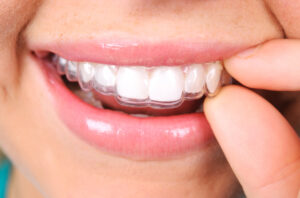
Oral Hygiene / Hygienist
Question:
What does a Hygienist Do?
Answer:
The Hygienist plays an important role in your dental health by not only treating periodontal (gum) disease but also providing the individual with the knowledge and skills to be able to maintain a healthy oral environment for life.
Our Motto
Gum Disease Symptoms
Although the symptoms of gum disease are often subtle, the condition is not entirely without warning signs. Certain indicators that may point to some form of the disease include:
- – Gums that bleed during and after brushing
- – Red, swollen or tender gums
- – Persistent bad breath or bad taste in the mouth
- – Receding gums
- – Formation of deep pockets between teeth and gums
- – Loose or shifting teeth
- – Changes in the way teeth fit together when biting
Any of these symptoms may signal a serious problem, which should be checked by a dentist. Despite aggressive oral care habits, people who are genetically predisposed may be up to six times more likely to develop some form of gum disease.
Gum Disease Treatment
The treatment for gum disease is to control any infection that exists and to stop progression of the disease. Treatment options include regular visits to our Hygienist, and healthy eating plus flossing, and non-surgical therapies that control the growth of harmful bacteria.
Although brushing and flossing are equally important, brushing only eliminates plaque from the surfaces of the teeth that the brush can reach.
Flossing removes plaque from between the teeth and under the gum line. Both should be used as part of a regular at-home treatment plan.
Our Hygienist recommends specialised electric toothbrushes, which are more effective at removing plaque than a standard toothbrush.
There are also some other treatments for gum disease. Using tartar-control toothpaste that contains fluoride will help slow the progress of gum disease. An antiseptic mouthwash, such as Listerine, will help kill bacteria. Carefully use a toothpick after meals if you are unable to brush your teeth right away. Stop using tobacco of any kind—it decreases your ability to fight infection of the gums and delays healing.
Question:
What do I do about Bad Breath?
Answer:
Everybody has bad breath from time to time, especially first thing in the morning. You also may have bad breath when you are hungry, when you are dieting, or after eating foods with a strong odour, such as garlic, onions, or pastrami.
Mouth and throat problems that can cause mouth odour include:
Throat or mouth infections, such as strep throat.
Dental problems, such as cavities.
Gum disease may cause a metallic breath odour.
Tonsils with deep tunnels that trap food particles.
Throat or mouth cancers.
To help improve your breath:
Gargle with water.
Brush your teeth, tongue, roof of your mouth, and gums at least twice a day with toothpaste.
Floss your teeth once each day.
Eat a low-fat diet rich in fruits and vegetables.
Eat less meat.
Do not smoke or use other tobacco products, such as snuff or chewing tobacco.
Eat at regular intervals. Dieting or missing meals can decrease saliva and cause bad breath.
Chew sugar-free gum, suck on sugar-free mints, or drink water, especially if your mouth is dry. Try using breath sticks, which contain the ingredients found in a mouthwash and dissolve in your mouth.
Use a mouthwash for temporary relief of bad breath. Swish it around in your mouth for 30 seconds before spitting it out.
Have regular dental checkups.
Other Services


Fillings are dental restorations that are used to fill in or cover over just a portion of a tooth. We predominantly use composite (white filling) material. We also use porcelain overlays to strengthen your teeth. Drill free & ozone filling treatments are available. Read More…


What does a Hygienist Do?
Answer:
The Hygienist plays an important role in your dental health by not only treating periodontal (gum) disease but also providing the individual with the knowledge and skills to be able to maintain a healthy oral environment for life. Read More…

This product is designed to be invisible with no sign of metal brackets a perfect alternative to traditional braces, Also suitable for adults.

Sleep Dentistry is designed for patients who dread going to the dentist. Many people feel afraid or uncomfortable when they are placed in vulnerable positions—like the dental chair—and may experience dental anxiety as a result. Sleep Dentistry is an option for patients who fear dental procedures, fear needles, have difficulty with their gag reflex, have very sensitive teeth, or have difficulty becoming numb from oral injections. Even though you are not technically asleep, many people recall the experience as seeming to be asleep.
Make An Appointment
We will get back in touch with you as soon as possible to discuss your dental needs.
